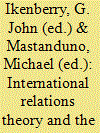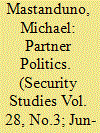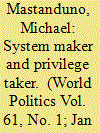| Srl | Item |
| 1 |
ID:
065896


|
|
|
| 2 |
ID:
050245


|
|
|
|
|
| Publication |
New York, Columbia University Press, 2003.
|
| Description |
vi, 450p.
|
| Standard Number |
0231125917
|
|
|
|
|
|
|
|
|
|
|
|
Copies: C:1/I:0,R:0,Q:0
Circulation
| Accession# | Call# | Current Location | Status | Policy | Location |
| 047578 | 327.095/IKE 047578 | Main | On Shelf | General | |
|
|
|
|
| 3 |
ID:
168922


|
|
|
|
|
| Summary/Abstract |
Hegemonic-order theory draws attention to relationships of asymmetrical power and legitimate consent. This article emphasizes the importance of “lynchpin partnerships” in the maintenance of hegemonic order. The postwar US order relied on partnerships with Germany and Japan, and after the Cold War the United States sought to enlarge its hegemony by offering partner bargains to Russia and China. The terms of partnership differed significantly based on the relative significance of each state to the management of America’s hegemonic order. That order is now in jeopardy given that the partnership with Russia failed, while that with China succeeded for two decades but is now under considerable strain. The US experience suggests that hegemonic orders are easier to establish than to extend, and, since the dominant state controls the terms of entry, liberal hegemonic orders are easier for some states to join than for others.
|
|
|
|
|
|
|
|
|
|
|
|
|
|
|
|
| 4 |
ID:
011874


|
|
|
|
|
| Publication |
Spring 1997.
|
| Description |
49-88
|
|
|
|
|
|
|
|
|
|
|
|
|
|
|
|
| 5 |
ID:
085933


|
|
|
|
|
| Publication |
2009.
|
| Summary/Abstract |
International relations theorists were slow to recognize that America's unipolar moment had the potential to become an enduring feature of global politics.
|
|
|
|
|
|
|
|
|
|
|
|
|
|
|
|
| 6 |
ID:
085924


|
|
|
|
|
| Publication |
2009.
|
| Summary/Abstract |
American primacy in the global disrtribution of capabilities is one of the most salient features of the contemporary international system.The end of the cold war did not return the world to multipolarity.Instead the United States-already materially preeminent-became more so.
|
|
|
|
|
|
|
|
|
|
|
|
|
|
|
|
| 7 |
ID:
065108


|
|
|